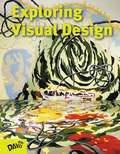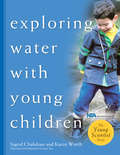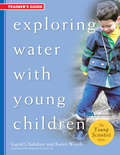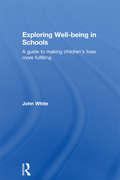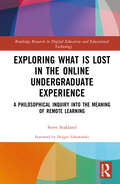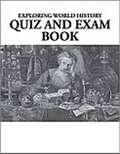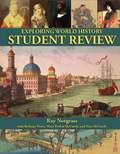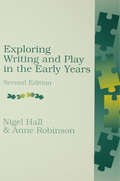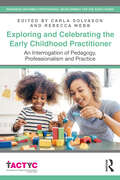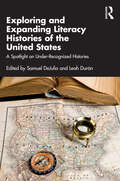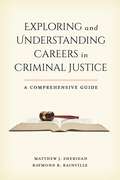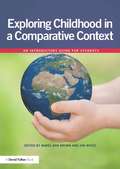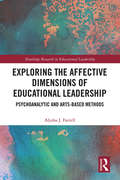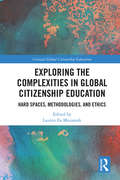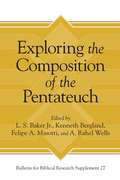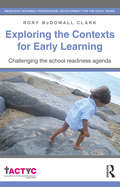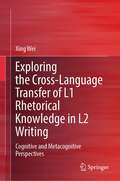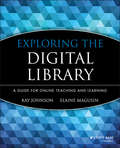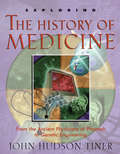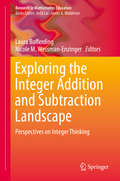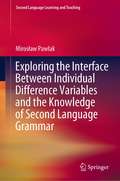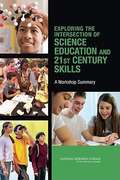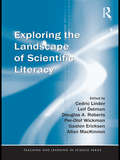- Table View
- List View
Exploring Visual Design: The Elements and Principles
by Joseph A. Gatto Albert W. Porter Jack SelleckNIMAC-sourced textbook
Exploring Water with Young Children
by Karen Worth Ingrid ChalufourLooking at science in a new way, Exploring Water with Young Children focuses children's explorations to help deepen their understanding of water and its properties--including concepts related to water's flow, appearance and effect on objects. The third unit in the Young Scientist Series, this field-tested curriculum supports the early development of important science inquiry skills such as questioning, investigating, discussing and formulating ideas and theories.Karen Worth is a graduate-level instructor in the early childhood education department at Wheelock College.Ingrid Chalufour has designed and conducted training programs for a variety of early childhood staff for more than 35 years. Both authors live in Newton, Massachusetts.
Exploring Water with Young Children, Trainer's Guide
by Karen Worth Ingrid ChalufourThe trainer's guide serves as an indispensable handbook for trainers and administrators interested in introducing staff to the Exploring Water with Young Children curriculum--from planning to implementation. From exploring sinking and floating to using books to extend science learning, seven basic and eight advanced workshops develop staff members' understanding of science and inquiry teaching skills. The guide also includes strategies for supporting teachers over time through mentoring and guided discussions, as well as an extensive resource list.
Exploring Well-Being in Schools: A Guide to Making Children's Lives more Fulfilling
by John Peter WhiteCan we teach others how to lead a fulfilling life? The notion of personal well-being has recently shot up the political and educational agendas, placing the child's well-being at the heart of the school’s task. With his renowned talent for distilling the most complex of philosophical arguments into accessible laymen's terms, John White addresses the maze of issues surrounding well-being, bringing clarity to this dissension and confusion. This accessible book expertly guides you through the conflicting perspectives on well-being found in the educational world by * Examining religious and secular views of human fulfilment and of a meaningful life. * Analysing the appeal of celebrity, wealth and consumerism to so many of our children. * Asking what role pleasure, success, autonomy, work, life-planning and worthwhile activities play in children's flourishing. * Showing how proposals to encourage children's well-being impact on schools' aims and learning arrangements. Whether you have little background in education and philosophy or are reading as a teacher, student or policy maker, this engaging book will take you right to the heart of these critical issues. It will leave you with a sharply-focused picture of a remodelled educational system fit for our new millennium, committed to helping every child to enjoy a fulfilling life.
Exploring What is Lost in the Online Undergraduate Experience: A Philosophical Inquiry into the Meaning of Remote Learning (Routledge Research in Digital Education and Educational Technology)
by Steve StaklandThis book examines the significance and meaning of undergraduate online learning using a hermeneutic phenomenological study, asking what is lost when there is no face-to-face contact and exploring the essence of technology itself. Drawing on data from undergraduate students across various higher education institutions, including both interview recordings and written reports of their lived experiences, the author seeks to uncover the essence of the phenomenon by engaging with themes around the philosophy of technology and the purpose of post-secondary education, using Heidegger’s essay The Question Concerning Technology as a crucial interpretive lens. Rather than offering generalized conclusions, it presents a basis for further understanding of the experience of online learning and ultimately asks whether the efficiency afforded to undergraduates by online classes or degrees can ever replace what is learned in a classroom with other people. Providing a novel approach to the topic of online learning, which centers the concept of experience, and drawing links to current conditions and pedagogy in online higher education, it will appeal to scholars working across education and philosophy with interests in higher education, technology and education, phenomenology of education and philosophy of education.
Exploring World History Quiz and Exam Book
by John NotgrassOne copy of the Quiz & Exam Book is already included in the Student Review Pack. If you have more than one child using Exploring World History, you can purchase an additional set of quizzes and exams. Each quiz and exam can be removed from the book and given to the student if desired.
Exploring World History Student Review
by Ray NotgrassThe Exploring World History Student Review Book is part of the Notgrass Exploring World History one-year high school curriculum. It includes review questions (covering each lesson, selected readings from In Their Words, and each of the recommended works of literature), commentary on Bible readings, and literary analysis of the twelve titles suggested for students.
Exploring Writing and Play in the Early Years
by Anne Robinson Nigel HallThe second edition of this text shows how play and literacy can combine to help young children develop a more complete understanding of writing, as well as literacy more generally. In addition to discussing the implications of the new Guidance for the Foundation Stage, the authors use more recent research to extend the discussion of how and why pla
Exploring and Celebrating the Early Childhood Practitioner: An Interrogation of Pedagogy, Professionalism and Practice (TACTYC)
by Carla Solvason Rebecca WebbThis exciting new book celebrates, interrogates and re-imagines the complex and demanding role of the Early Childhood Practitioner. Exploring the many different facets of the Early Childhood Practitioner’s (ECP) role, it challenges normative constructions of practitioners and how they have been shaped by assumptions of history, culture and policy. Drawing on a range of theoretical presumptions and debates, the chapters champion the multidimensional power and potentiality of the ECP, arguing for greater respect and recognition for a role that supports and enables at a crucial time in a child’s life. With opportunities for reflection, key topics include: The specialist pedagogical expertise of the ECP The key role that ECPs play in the child’s holistic wellbeing The ECP as diplomat across many professional contexts, effectively communicating with families and professionals The creative ECP, pushing traditional, normative boundaries of practice The ECP as so much more than they are customarily perceived as being. This latest addition to the TACTYC series will be valuable reading for Early Years students – particularly on Masters level courses – as well as those working and researching in the Early Years sector.
Exploring and Expanding Literacy Histories of the United States: A Spotlight on Under-Recognized Histories
by Samuel DeJulio Leah DuránExploring and Expanding Literacy Histories of the United States brings together new scholarship and critical perspectives hitherto missing from dominant narratives to offer a racially, ethnically, and linguistically diverse record of the history of American reading instruction. This book addresses the many important developments in the history of literacy in the United States that occurred outside of mainstream public education, in marginalized communities in and outside of traditional school contexts.Instead of a “top-down” approach of prominent thinkers and theorists, the book intends to cover key blind spots, including literacy education in Indigenous nations, and how marginalized groups have fought for access to education, by applying a critical lens to the under-recognized histories of literacy.This volume is essential reading for courses on History of Reading Education and Foundations of Literacy.
Exploring and Teaching Healthcare Communication: Clinicians’ Perspectives in Hong Kong
by Jack PunThis book brings together frontline clinicians from diverse healthcare fields—including Medicine, Intensive Care, Neurology, Geriatrics, Oncology, Palliative Care, Nursing, Traditional Chinese Medicine, and Veterinary Medicine—to share their insights, experiences, and strategies for effective clinical communication. Drawing on research and real-world practices, the author provides evidence-based and practical recommendations for teaching, studying, and implementing effective communication in healthcare. Special attention is given to the role of cultural expectations, particularly in bilingual and multicultural medical contexts. Using Hong Kong as a case study, the book explores its unique integration of Western and Chinese values to offer a comparative perspective applicable to other healthcare settings worldwide. It argues for the development of a culturally appropriate communication model, informed by clinicians&’ insights, to enhance therapeutic relationships and ensure patient safety. This book is an essential resource for medical educators, healthcare professionals, doctors and nurses in training, medical students, health communication researchers, and scholars in applied linguistics and related fields.
Exploring and Understanding Careers in Criminal Justice: A Comprehensive Guide
by Matthew J. Sheridan Raymond R. RainvilleCriminal justice careers typically fall into one of two categories: law enforcement or legal. But contrary to what many may know about the career opportunities in criminal justice, it is more than just becoming a cop or a lawyer. In Exploring and Understanding Careers and Opportunities in Criminal Justice, Matthew J. Sheridan and Raymond R. Rainville provide a practical, comprehensive guide that easily explains the extensive operations and the scope of employment possibilities and opportunities in the criminal justice profession. They cover many criminal justice functions and career paths that are seldom discussed when preparing for a career in criminal justice. Rainville and Sheridan focus on how to obtain employment in a career field that fits personal strengths and aspirations and emphasize the value of internships and service learning as tools to obtain the desired position. A career in criminal justice is a process of many potential outcomes. The career professional who plans, continues personal development, and prepares their career path will discover many potential rewards that include satisfaction during and after their career. The field of criminal justice will continue to expand and grow. Legislative mandates will promote new policies and employment opportunities to keep pace with changes and improvements in criminal justice practices to meet needs that enable the career professional to protect and serve. As the title suggests, anyone interested in exploring and understanding the field of criminal justice and the opportunities it can provide needs to read this book. Sheridan and Rainville make it known that there are more options in the field of criminal justice than you thought, and that the process for obtaining employment and developing the career path you desire most can be done!
Exploring childhood in a comparative context: An introductory guide for students
by Mabel Ann Brown Jon WhiteExploring Childhood in a Comparative Context meets an increasing need for students focusing on early childhood to be familiar with alternative practices in other countries. Providing a ready-made source of information about a wide range of countries including Finland, the Netherlands, the United States, New Zealand, Japan, South Africa and many more, the book clearly describes the way each country understands and conceptualises childhood. Each chapter includes contextual information about the country, an introduction to the theory that has shaped practice and describes the curriculum for pre-school and primary education. Including vignettes from practitioners working in each country to illustrate practice, the chapters explore key themes such as: Child development Parental involvement Teaching and learning Professionalism Assessment Pupil experience. Accessibly written and including opportunities for reflection, this timely new book will give students a valuable insight into alternative education systems that is essential if they are to become practitioners with a current and global approach.
Exploring the Affective Dimensions of Educational Leadership: Psychoanalytic and Arts-based Methods (Routledge Research in Educational Leadership)
by Alysha J. FarrellBridging the gap between academic parlance and arts-based inquiry, this unique text presents a socio-affective exploration of educational leadership. The text challenges inherited ideological and normative assumptions and invites its reader to reimagine leadership as a dynamic, emotional, and relational process. Exploring the Affective Dimensions of Educational Leadership combines the ambiguity of arts-based work with the interpretative power of psychoanalysis to illustrate the role of mutuality, personal interpretations, and formative relations on leadership practices. By emphasizing leadership as the constant striving for recognition, the chapters expose the affective dimensions that infuse educational leadership practice and in doing so, propose a new way for educational leaders to respond to complex and emotionally charged incidents in school contexts, thereby promoting democratic practice and positive collegial relations. An engaging and insightful text, this book will be of great interest to graduate and postgraduate students, researchers, academics, and professionals in the fields of educational leadership, educational research, and psychoanalysis.
Exploring the Complexities in Global Citizenship Education: Hard Spaces, Methodologies, and Ethics (Critical Global Citizenship Education)
by Lauren MisiaszekWith a focus on the Global South, this book argues that awareness and discussion of the politics of equity and inclusion in global citizenship education (GCE) research are essential to the future of nuanced and effective research in this area. Misiaszek explores the notion of heavily regulated "hard spaces" to examine areas of institutional "blindness" and reflects on ways to negotiate the issue of "sensitivity" in an institutional context, exploring how one’s sensitivity relates to pedagogy and ethics. Through this in-depth meta-discussion of GCE research, Misiaszek provides a complex portrait of unique challenges in this domain and explores the nuanced experience of navigating temporal intersections of the global, the citizen, and education in geographically and thematically-obstacled spaces. This book will be of great interest to researchers, policymakers, academics and postgraduate students in the fields of global education, comparative education, and educational policy.
Exploring the Composition of the Pentateuch (Bulletin for Biblical Research Supplement #27)
by L. S. Baker Kenneth Bergland Felipe A. Masotti A. Rahel WellsFor many years, the historical-critical quest for a reconstruction of the origin(s) and development of the Pentateuch or Hexateuch has been dominated by the documentary hypothesis, the heuristic power of which has produced a consensus so strong that an interpreter who did not operate within its framework was hardly regarded as a scholar. However, the relentless march of research on this topic has continued to yield new and refined analyses, data, methodological tools, and criticism. In this spirit, the contributions to this volume investigate new ideas about the composition of the Pentateuch arising from careful analysis of the biblical text against its ancient Near Eastern background.Covering a wide spectrum of topics and diverging perspectives, the chapters in this book are grouped into two parts. The first is primarily concerned with the history of scholarship and alternative approaches to the development of the Pentateuch. The second focuses on the exegesis of particular texts relevant to the composition of the Torah. The aim of the project is to foster investigation and collegial dialogue in a spirit of humility and frankness, without imposing uniformity.In addition to the editors, the contributors include Tiago Arrais, Richard E. Averbeck, John S. Bergsma, Joshua A. Berman, Daniel I. Block, Richard Davidson, Roy E. Gane, Duane A. Garrett, Richard S. Hess, Benjamin Kilchör, Michael LeFebvre, Jiří Moskala, and Christian Vogel.
Exploring the Composition of the Pentateuch (Bulletin for Biblical Research Supplement #27)
by L. S. Baker Kenneth Bergland Felipe A. Masotti A. Rahel WellsFor many years, the historical-critical quest for a reconstruction of the origin(s) and development of the Pentateuch or Hexateuch has been dominated by the documentary hypothesis, the heuristic power of which has produced a consensus so strong that an interpreter who did not operate within its framework was hardly regarded as a scholar. However, the relentless march of research on this topic has continued to yield new and refined analyses, data, methodological tools, and criticism. In this spirit, the contributions to this volume investigate new ideas about the composition of the Pentateuch arising from careful analysis of the biblical text against its ancient Near Eastern background.Covering a wide spectrum of topics and diverging perspectives, the chapters in this book are grouped into two parts. The first is primarily concerned with the history of scholarship and alternative approaches to the development of the Pentateuch. The second focuses on the exegesis of particular texts relevant to the composition of the Torah. The aim of the project is to foster investigation and collegial dialogue in a spirit of humility and frankness, without imposing uniformity.In addition to the editors, the contributors include Tiago Arrais, Richard E. Averbeck, John S. Bergsma, Joshua A. Berman, Daniel I. Block, Richard Davidson, Roy E. Gane, Duane A. Garrett, Richard S. Hess, Benjamin Kilchör, Michael LeFebvre, Jiří Moskala, and Christian Vogel.
Exploring the Contexts for Early Learning: Challenging the school readiness agenda (TACTYC)
by Rory McDowall ClarkThe concept of ‘readiness for school’ is attractive to policy-makers, but many academics, researchers and practitioners argue that an early start to formal learning may be misguided. This book introduces readers to an increasing body of evidence which demonstrates that young children need opportunities to learn and develop in environments that support their emotional and cognitive needs, offering opportunities to develop autonomy, competence and self-regulation skills. With advice on implementing research findings in practice, this book provides clear guidance on how to foster and develop these attributes, scaffold steps into new areas of learning and support children in facing new challenges. Chapters cover: Policy and discourses; Taking account of development; Approaches to Early Years Learning; The Diversity of Children’s Early Experiences; Transitions and starting school; Where to in the Future? Exploring the Contexts for Early Learning will be essential reading for students, practitioners, policy-makers and all those interested in the school readiness agenda.
Exploring the Cross-Language Transfer of L1 Rhetorical Knowledge in L2 Writing: Cognitive and Metacognitive Perspectives
by Xing WeiThis book addresses the transfer of rhetorical knowledge from a first language (L1) to a second language (L1-to-L2 rhetorical transfer), a common cognitive phenomenon in the L2 writing of students in foreign language learning environments. It investigates L1-to-L2 rhetorical transfer from a cognitive perspective and examines a specific component of L2 writers’ agency in this transfer, namely metacognition. The book’s ultimate goal is to enhance our understanding of the cognitive mechanism of rhetorical transfer across languages. This goal is in turn connected to the need to determine how L1 rhetorical knowledge can be steered and oriented toward successful L2 writing.To this end, this book proposes a theoretical framework for transfer studies, encompassing the dimensions of text, transfer agency, and L2 essay raters. It facilitates an in-depth exploration of the intricacies involved in L1-to-L2 rhetorical transfer. It then presents empirical studies on this transfer. Embracing a dynamic perspective, this book furthers our understanding of interlingual rhetorical transfer as a conscious or intuitive process for making meaning, one that can be monitored and steered. Moreover, it discusses the pedagogical implications for L2 writing instruction that guides students to use metacognition to transfer L1 rhetorical knowledge during L2 writing.
Exploring the Digital Library
by Johnson Elaine Kay MagusinExploring the Digital Library, a volume in The Jossey-Bass Online Teaching and Learning series, addresses the key issue of library services for faculty and their students in the online learning environment. Written by librarians at Athabasca University, a leading institution in distance education, this book shows how faculty can effectively use digital libraries in their day-to-day work and in the design of electronic courses. Exploring the Digital Library is filled with information, ideas, and Discusses how information and communication technologies are transforming scholarship communication Provides suggestions for integrating digital libraries into teaching and course development Describes approaches to promoting information literacy skills and integrating these skills across the curriculum Outlines the skills and knowledge required in digital library use Suggests opportunities for faculty and librarians to collaborate in the online educational environment
Exploring the History of Medicine
by John Hudson TinerFrom surgery to vaccines, man has made great strides in the field of medicine. Quality of life has improved dramatically in the last few decades alone, and the future is bright. But students must not forget that God provided humans with minds and resources to bring about these advances. A biblical perspective of healing and the use of medicine provides the best foundation for treating diseases and injury. In Exploring the World of Medicine, author John Hudson Tiner reveals the spectacular discoveries that started with men and women who used their abilities to better mankind and give glory to God. The fascinating history of medicine comes alive in this book, providing students with a healthy dose of facts, mini-biographies, and vintage illustrations. Includes chapter tests and index.
Exploring the Integer Addition and Subtraction Landscape: Perspectives on Integer Thinking (Research in Mathematics Education)
by Laura Bofferding Nicole M. Wessman-EnzingerOver the past few decades there has been increased interest in how students and teachers think and learn about negative numbers from a variety of perspectives. In particular, there has been debate about when integers should be taught and how to teach them to best support students’ learning. This book brings together recent work from researchers to illuminate the state of our understanding about issues related to integer addition and subtraction with a goal of highlighting how the variety of perspectives support each other or contribute to the field in unique ways. In particular, this book focuses on three main areas of integer work: students’ thinking, models and metaphors, and teachers’ thinking. Each chapter highlights a theoretically guided study centered on integer addition and subtraction. Internationally known scholars help connect the perspectives and offer additional insights through section commentaries. This book is an invaluable resource to those who are interested in mathematics education and numerical thinking.
Exploring the Interface Between Individual Difference Variables and the Knowledge of Second Language Grammar (Second Language Learning and Teaching)
by Mirosław PawlakThe last few decades have seen extensive research focusing of the relative effectiveness of different instructional options that can be employed in teaching grammar structures (e.g., deduction and induction, different types of corrective feedback, input-based vs. output-based practice). However, the contribution of such pedagogical intervention and the resulting knowledge of target language grammar are mediated by a number of factors related to a specific context, the properties of the features being taught and, most importantly, individual learner profiles. Nonetheless, research into the moderating role of individual difference variables has been scant, limited to only several factors, and seldom taking into account complex interactions between variables. The book seeks to fill this evident gap by investigating the mediating effect of selected cognitive and affective factors on explicit and implicit (or highly automatized) knowledge of the English passive voice. In doing so, the study sheds the so-much-needed light on the predictors of second language grammar knowledge but also, to some extent, on the usefulness of instructional techniques used to develop it.
Exploring the Intersection of Science Education and 21st Century Skills: A Workshop Summary
by National Research Council of the National AcademiesAn emerging body of research suggests that a set of broad "21st century skills"--such as adaptability, complex communication skills, and the ability to solve non-routine problems--are valuable across a wide range of jobs in the national economy. However, the role of K-12 education in helping students learn these skills is a subject of current debate. Some business and education groups have advocated infusing 21st century skills into the school curriculum, and several states have launched such efforts. Other observers argue that focusing on skills detracts attention from learning of important content knowledge. To explore these issues, the National Research Council conducted a workshop, summarized in this volume, on science education as a context for development of 21st century skills. Science is seen as a promising context because it is not only a body of accepted knowledge, but also involves processes that lead to this knowledge. Engaging students in scientific processes--including talk and argument, modeling and representation, and learning from investigations--builds science proficiency. At the same time, this engagement may develop 21st century skills. Exploring the Intersection of Science Education and 21st Century Skills addresses key questions about the overlap between 21st century skills and scientific content and knowledge; explores promising models or approaches for teaching these abilities; and reviews the evidence about the transferability of these skills to real workplace applications.
Exploring the Landscape of Scientific Literacy (Teaching and Learning in Science Series)
by Cedric LinderScientific literacy is part of national science education curricula worldwide. In this volume, an international group of distinguished scholars offer new ways to look at the key ideas and practices associated with promoting scientific literacy in schools and higher education. The goal is to open up the debate on scientific literacy, particularly around the tension between theoretical and practical issues related to teaching and learning science. Uniquely drawing together and examining a rich, diverse set of approaches and policy and practice exemplars, the book takes a pragmatic and inclusive perspective on curriculum reform and learning, and presents a future vision for science education research and practice by articulating a more expansive notion of scientific literacy.
